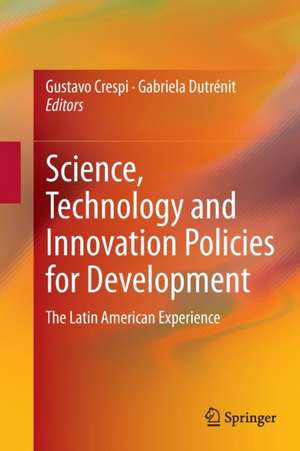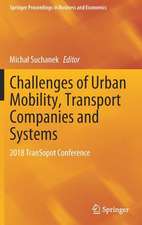Science, Technology and Innovation Policies for Development: The Latin American Experience
Editat de Gustavo Crespi, Gabriela Dutréniten Limba Engleză Paperback – 3 sep 2016
Since the pioneering work of Solow (1957), it has been recognized that innovation is critical for economic growth both in developed and in less-developed countries. Unfortunately Latin America lags behind world trends, and although over the last 20 years the region has established a more stable and certain macroeconomic regime, it is also clear that these changes have not been enough to trigger a process of innovation and productivity to catch-up. Against this rather grim scenario there is some optimism emerging throughout the region. After many years of inaction the region has begun to invest in science, technology and engineering once again. Furthermore, after many changes in innovation policy frameworks, there is now an emerging consensus on the need for a solution to coordination failures that hinder the interaction between supply and demand.
Offering an informative and analytic insight into STI policymaking within Latin America, this book can be used by students, researchers and practitioners who are interested in the design and implementation of innovation policies. This book also intends to encourage discussion and collaboration amongst current policy makers within the region.
| Toate formatele și edițiile | Preț | Express |
|---|---|---|
| Paperback (1) | 640.55 lei 6-8 săpt. | |
| Springer International Publishing – 3 sep 2016 | 640.55 lei 6-8 săpt. | |
| Hardback (1) | 644.95 lei 6-8 săpt. | |
| Springer International Publishing – 30 apr 2014 | 644.95 lei 6-8 săpt. |
Preț: 640.55 lei
Preț vechi: 753.60 lei
-15% Nou
Puncte Express: 961
Preț estimativ în valută:
122.58€ • 133.11$ • 102.97£
122.58€ • 133.11$ • 102.97£
Carte tipărită la comandă
Livrare economică 23 aprilie-07 mai
Preluare comenzi: 021 569.72.76
Specificații
ISBN-13: 9783319375779
ISBN-10: 3319375776
Pagini: 297
Ilustrații: XII, 285 p. 24 illus., 20 illus. in color.
Dimensiuni: 155 x 235 x 16 mm
Greutate: 0.42 kg
Ediția:Softcover reprint of the original 1st ed. 2014
Editura: Springer International Publishing
Colecția Springer
Locul publicării:Cham, Switzerland
ISBN-10: 3319375776
Pagini: 297
Ilustrații: XII, 285 p. 24 illus., 20 illus. in color.
Dimensiuni: 155 x 235 x 16 mm
Greutate: 0.42 kg
Ediția:Softcover reprint of the original 1st ed. 2014
Editura: Springer International Publishing
Colecția Springer
Locul publicării:Cham, Switzerland
Cuprins
1. The changing role of science, technology and innovation policy in building systems of innovation: the case of Mexico.- 2. Evolution of the Public Institutions of Science, Technology and Innovation in Chile: 1990-2012.- 3. Insights into the impact of BID’s Technology Modernization Program on Argentina’s STI policy.- 4. Innovation, Production and Innovation Systems and the BNDES’ Contribution.- 5. Inclusive Innovation Against all Odds: the case of Peru.- 6. Value attributed to STI Activities and Policies in Uruguay.- 7. From Design to the Institutional Construction of a Policy for Science, Technology and innovation in El Salvador.- 8. Policy Coordination: From FDI to a broader framework to promote innovation. The case of Costa Rica.- 9. Design and Evaluation of Fiscal Incentives for Business Innovation in Latin America: Lessons Learned after 20 years of experimentation.- 10. Science, technology and innovation policies for inclusive development: shifting trends in South America.
Notă biografică
Gabriela Dutrénit is Professor of Economics and Innovation Management at the Universidad Autónoma Metropolitana, and she is currently the President of Mexico´s Advisory Forum on Science and Technology, an advisory organism of STI policies to the government. She holds a PhD. degree from the University of Sussex (SPRU). She is a regular member of the Mexican Academy of Science. She is part of the International Scientific Committee of Global Network for Economics of Learning, Innovation and Competence Building Systems (Globelics) and is the Coordinator of the Latin American Network for Economics of Learning, Innovation and Competence Building Systems (LALICS). Her research interests include: innovation and development, in particular learning and technological capability accumulation at the firm level; university–industry linkages; research and development (R&D) and innovation policy.
Gustavo Crespi is a Lead Competitiveness and Innovation at the Inter-American Development Bank (IADB). He holds a PhD. degree from the University of Sussex (SPRU), a M.A. degree from the University of Chile and a bachelor’s degree from the National University of Cordoba, Argentina. He was also Senior Program Officer of the International Development Research Center (IDRC), Canada. He has published numerous articles in journals such as Word Development, Research Policy, Journal of Technology Transfer, Oxford Review of Economic Policy, Technovation and Small Business Economics. He is also a member of the regional advisory board of Research Policy and the International Journal of Technology Learning, Innovation and Development.
Gustavo Crespi is a Lead Competitiveness and Innovation at the Inter-American Development Bank (IADB). He holds a PhD. degree from the University of Sussex (SPRU), a M.A. degree from the University of Chile and a bachelor’s degree from the National University of Cordoba, Argentina. He was also Senior Program Officer of the International Development Research Center (IDRC), Canada. He has published numerous articles in journals such as Word Development, Research Policy, Journal of Technology Transfer, Oxford Review of Economic Policy, Technovation and Small Business Economics. He is also a member of the regional advisory board of Research Policy and the International Journal of Technology Learning, Innovation and Development.
Textul de pe ultima copertă
This book examines the implementation of science, technology and innovation (STI) policy in eight Latin American countries and the different paths these policies have taken. It provides empirical evidence to examine the extent to which STI policies are contributing to the development of the region, as well as to the solution of market failures and the stimulus of the region’s innovation systems.
Since the pioneering work of Solow (1957), it has been recognized that innovation is critical for economic growth both in developed and in less-developed countries. Unfortunately Latin America lags behind world trends, and although over the last 20 years the region has established a more stable and certain macroeconomic regime, it is also clear that these changes have not been enough to trigger a process of innovation and productivity to catch-up. Against this rather grim scenario there is some optimism emerging throughout the region. After many years of inaction the region has begun to invest in science, technology and engineering once again. Furthermore, after many changes in innovation policy frameworks, there is now an emerging consensus on the need for a solution to coordination failures that hinder the interaction between supply and demand.
Offering an informative and analytic insight into STI policymaking within Latin America, this book can be used by students, researchers and practitioners who are interested in the design and implementation of innovation policies. This book also intends to encourage discussion and collaboration amongst current policy makers within the region.
Since the pioneering work of Solow (1957), it has been recognized that innovation is critical for economic growth both in developed and in less-developed countries. Unfortunately Latin America lags behind world trends, and although over the last 20 years the region has established a more stable and certain macroeconomic regime, it is also clear that these changes have not been enough to trigger a process of innovation and productivity to catch-up. Against this rather grim scenario there is some optimism emerging throughout the region. After many years of inaction the region has begun to invest in science, technology and engineering once again. Furthermore, after many changes in innovation policy frameworks, there is now an emerging consensus on the need for a solution to coordination failures that hinder the interaction between supply and demand.
Offering an informative and analytic insight into STI policymaking within Latin America, this book can be used by students, researchers and practitioners who are interested in the design and implementation of innovation policies. This book also intends to encourage discussion and collaboration amongst current policy makers within the region.
Caracteristici
Collects the experiences of eight Latin American countries with different approaches regarding STI policy to chart the evolution of the policy making process in Latin America Compares similarities, learning experiences and impacts of STI policies to provide examples and recommendations emerging from success and failure cases from within this region Considers STI policy on a country-wide and national level to give a full picture of the policies, programs and institutions involved Includes supplementary material: sn.pub/extras























